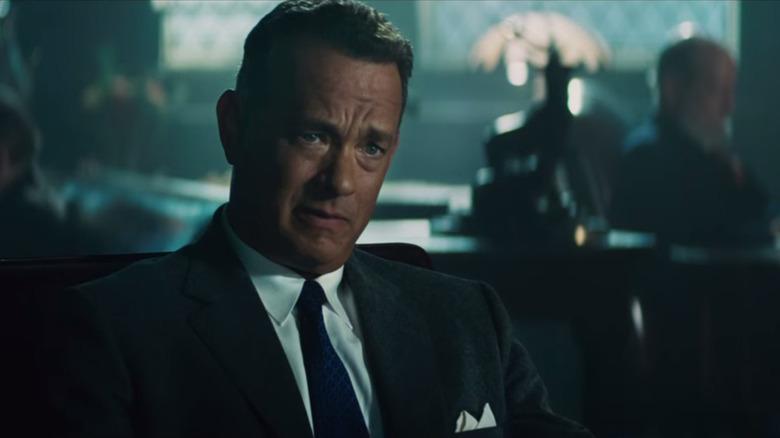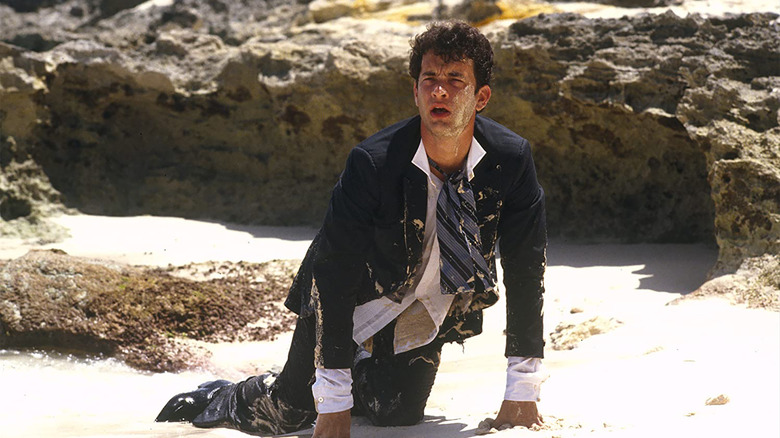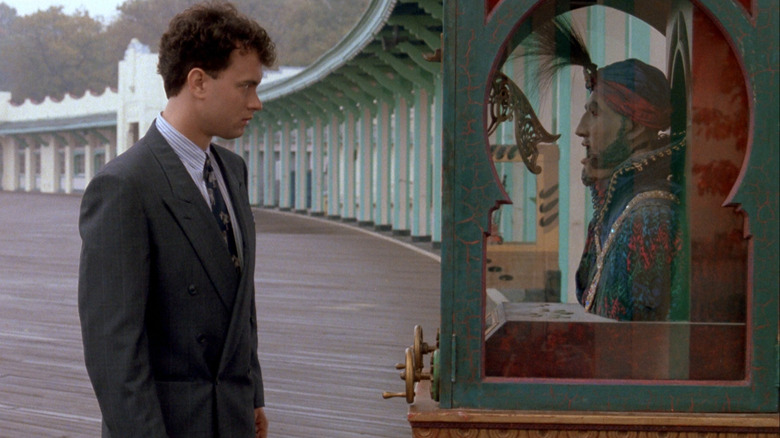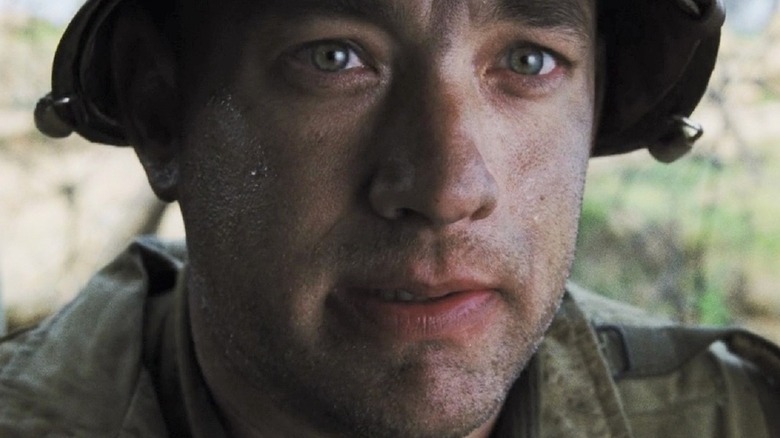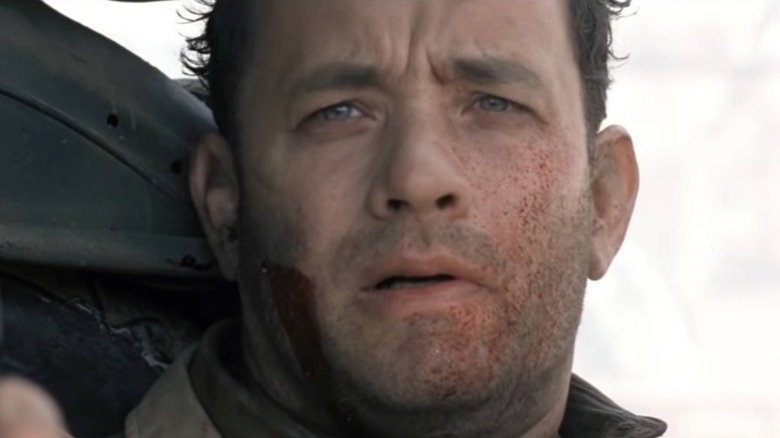Tom Hanks Is The Best Actor Ever
Somewhere in between his Oscar-winning portrayal of a gay lawyer dying of AIDS in "Philadelphia" and his performance as the mild-mannered captain of an Army detachment ordered to rescue the sole surviving son of a family that lost three of their children to the Normandy Invasion in "Saving Private Ryan," Tom Hanks was declared the James Stewart of his generation. The evidence was compelling. As Forrest Gump, astronaut Jim Lovell, and Sheriff Woody, Hanks had come to exemplify all that is right and decent about America. We saw the best of ourselves in his characters, while, off-screen, he exuded good, clean charm whenever he turned up on a talk show or a red carpet. He seemed affable, erudite, and kind. But to call him the Baby Boomer James Stewart was to ignore Stewart's willingness to play hard against type.
It is 2023, and Hanks has just delivered his first truly (intentionally) unlikable character in Colonel Tom Parker. Prior to this, he'd never challenged us to doubt him, let alone despise him. He played a stone killer in Sam Mendes' "Road to Perdition," but that was a "Lone Wolf and Cub" riff where, regardless of his character's viciousness, we rooted for him to protect his son.
Where is Hanks' "Vertigo" or "The Naked Spur?" I'm afraid it's back in the 1950s when maestros like Alfred Hitchcock and Anthony Mann could craft a morally ambiguous thriller or Western without having to justify the production's existence by positioning it as an Academy Awards contender. When/if Hanks opts to play a Scottie Ferguson or Howard Kemp, it won't just be a movie. The Oscar campaigning will begin in pre-production.
But what's the use in bemoaning what Hanks hasn't made when, for over 40 years, he has been one of our most reliably superb actors?
The breakout
"Splash" was only Hanks' second film role and his first lead, but he was hardly an unknown. He'd put in two seasons as the cross-dressing Kip Wilson on ABC's "Bosom Buddies," and probably would've done more had the network not sabotaged the show's Nielsen ratings by shifting it all over the schedule. ABC's incompetence turned out to be a blessing because Hanks was ready to pop.
Directed by Ron Howard and written by the '80s go-to comedy duo of Lowell Ganz and Babaloo Mandel, "Splash" paired Hanks with Daryl Hannah, who plays a mermaid smitten with the man she saved from drowning when he was a young boy. It's an irredeemably silly premise for a romantic comedy, but execution is everything, and "Splash" is loaded with comedic talent. John Candy absolutely slays as Hanks' carousing brother/business partner. This was the "SCTV" star's first meaty role, and he makes a 14-course meal out of it, but Hanks plays off him nimbly, setting him up for belly laughs while swiping a giggle or two for himself.
While Hannah works wonders with a role that offers little in the way of dialogue, Hanks is the engine that powers "Splash" through its airy narrative. There's nothing exceptional about his Allen Bauer. He's a lovelorn schlub who runs a fruit and vegetable supplier. But he deftly banters with the boorish Candy and generates such palpable chemistry with Hannah that we buy all the way into his ludicrous predicament. Allen isn't a loser; he's a guy understandably hooked on a bizarre encounter from his childhood that has ruined romance for him. The film's resolution is "Grease"-like in its magical thinking, but wholly appropriate given the material.
In any event, if Hanks could sell the heck out of "Splash," imagine what he could do with less frivolous material.
The career
Rather than challenge himself, Tom Hanks doubled down on being goofball Tom Hanks, which resulted in a string of bawdy comedies wherein the star behaved like a massive jackass. Basically, he adopted Candy's horndog persona from "Splash," and cranked it up to 11. The James Stewart comparison breaks down with Neal Israel's 1984 raunch-a-rama "Bachelor Party," though I invite you to imagine the conservative Pennsylvanian sending a spectacularly well-endowed male stripper to deliver an all-meat hot dog to his soon-to-be mother-in-law.
Hanks was playing in the Bill Murray sandbox at this point. Unfortunately, he was getting the scripts Murray rejected. "Bachelor Party" has aged like a store-brand cheese plate, but at least it's funny. "The Man with One Red Shoe" and "Volunteers" (which re-teamed Hanks with Candy to negligible effect) are shockingly laugh-free. "The Money Pit" is an overproduced bore best remembered for Hanks' crescendoing hysterics in response to a bathtub plummeting through the floor of his upstairs bathroom. He's agreeably zany playing off Dan Aykroyd's spot-on Jack Webb impersonation in "Dragnet," and I still can't decide if he's perfect or awful as a self-destructive stand-up comic in "Punchline."
Hanks finally harnessed his loose-limbed energy as the grown-up Josh Baskin in Penny Marshall's "Big." It was a necessary corrective to the meathead antics of his biggest post-"Splash" hits. He's winning and ultimately heartbreaking as a 12-year-old boy who comes of age way too soon, and he deservedly earned his first Oscar nomination for Best Actor. He should've received his second as a paranoid Reaganite in Joe Dante's brilliant "The 'Burbs," but the dark comedy was rejected by critics. John Patrick Shanley's wonderful "Joe Versus the Volcano" was also, shamefully, declared a failure.
After a legitimate fiasco as Sherman McCoy in Brian De Palma's wrongheaded adaptation of Tom Wolfe's "Bonfire of the Vanities," Hanks buckled down and sought out projects from establishment-approved filmmakers. He was done with taking risks. It was time to be Academy Award-nominee Tom Hanks.
The defining performance
My brain tells me Hanks' definitive performance is as Chuck Noland in "Cast Away." He pulls off a De Niro-esque physical transformation and leaves us weeping for the fate of a volleyball, but my heart is with Captain John H. Miller in "Saving Private Ryan."
The Omaha Beach sequence is rightly hailed for its blunt ferocity, but there's not a chance mainstream audiences would have stomached that slaughter without Hanks as their center of gravity. It's a canny deployment of star power that gives Spielberg carte blanche to depict the bloody beachhead as it happened. We're shell-shocked until Hanks and his men find cover, at which point their grit and ingenuity get us focused on the task at hand. Miller isn't an exceptional man, but he's holding it together as bullets whizz within flesh-shredding distance.
Who is Miller? Why is he the lodestar instead of Tom Sizemore's unflappable second-in-command or Edward Burns' headstrong, combat-hardened grunt? The soldiers have a running bet as to what Miller did before the war, and as they plunge deep behind enemy lines, he slakes their curiosity. He's a schoolteacher.
The middle of American masculinity
I can't imagine this reveal hitting nearly as hard with anyone else in the part, including Stewart. It's not surprising. Hanks had been playing boy scouts for years. It's the realization that a good person who's devoted his life to educating children in the hopes of forestalling wars like the one in which he's mired is here, boots on the ground, killing his fellow man. This is what war does.
Hanks eschews John Wayne's heroic swagger and plays Miller as a damaged leader of men (visually represented by his trembling hand). He is the best you can ask for in a pitched battle for the soul of the planet. If Wayne and Stewart represent two ends of the American male spectrum (which was made plain in John Ford's "The Man Who Shot Liberty Valance"), Hanks lands in the middle. He's here because his conscience left him no other choice.
Hanks dies with his boots on in "Saving Private Ryan," but we take no comfort in this. It is a tragedy that he had to be there at all. It's a long goddamn way from "Bachelor Party," but there's a time when the party must stop. Hanks was the right man for the mission where the mission was a man.
